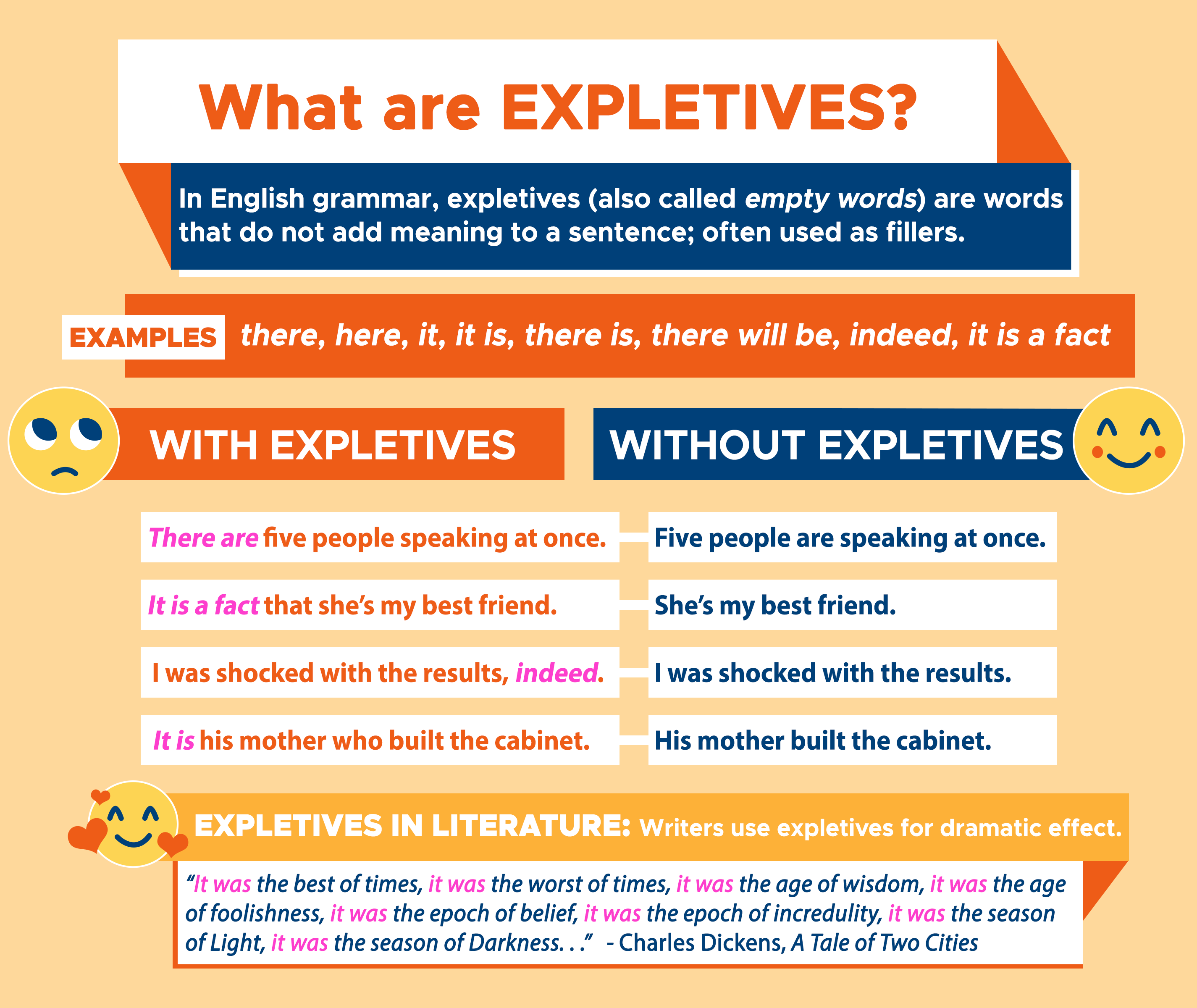Let’s learn about the definition of an expletive and how it is used.
What are Expletives?
There are better ways to start a sentence other than with “there are.” In English grammar, certain words and phrases are considered expletives – words that do not add meaning to a sentence and are often used as fillers. They are also called empty words. The most common expletives are “there,” “here,” “it” followed by any form of the verb “to be,” such as “there are,” “there will be,” “here is,” and “it is.” Other examples are “indeed”, “in fact”, and “do.”
In everyday language, expletives also mean cuss words or swear words which are used to stress a point. But in a grammatical sense, expletives can weaken your writing; so, spot them right away and reconstruct when necessary. Go back to our first sentence and try to chop off the expletive. A better version would be, “Don’t use ‘there are’ to start a sentence.”

Expletives in Sentences:
The absence of empty words makes a sentence more concise and commanding. Note the effect of removing expletives in the sentences below.
With expletive: There is a version of you living in my memory.
Without expletive: A version of you lives in my memory.
With expletive: Here is the reason I skipped classes: I went to a concert.
Without expletive: I skipped classes because I went to a concert.
Without expletive: I skipped classes to go to a concert.
With expletive: We visit our grandparents every summer
Without expletive: We do visit our grandparents every summer.
With expletive: It is a fact that he is the youngest CEO in the company’s history.
Without expletive: He is the youngest CEO in the company’s history.
Watch Out for Expletive Exceptions:
Use of Expletives in Literature:
Some of the greatest authors use expletives as a rhetorical device to add color and emphasis to their masterpiece.
From A Tale of Two Cities by Charles Dickens:
“It was the best of times, it was the worst of times, it was the age of wisdom, it was the age of foolishness, it was the epoch of belief, it was the epoch of incredulity, it was the season of Light, it was the season of Darkness. . .”
Notice the rhythm created by expletives and how they strongly evoke the psyche of the era Dickens refers to.
From A Clean, Well-Lighted Place by Ernest Hemingway:
“It was late and every one had left the cafe except an old man who sat in the shadow the leaves of the tree made against the electric light.”
Here, the expletive diverts the readers to the melancholic scene at the café.
Use an Expletive for Dramatic Effect:
You don’t need to be Hemingway or Dickens to use expletives like magic. Experiment with different writing styles to fuel your message and steal your readers’ eyes. Some seasoned writers use expletives to delay the subject in a sentence for dramatic effect.
- Nobody knew it was him who saved the child from drowning.
- There was once a spark between them, but they were too young to realize.
- Marla introduced her mother and said, “Here is the woman who made my dream a reality. Here is the woman I aspire to be.”
Necessary Expletives:
In some sentences where the subject is an infinitive phrase (“to” + verb) or a that-clause, an expletive is a better sentence starter.
Infinitive phrase as a subject: To ace the exam is her goal. [less natural]
With expletive it: It is her goal to ace the exam. [more natural]
That-clause as a subject: That he arrived early was a big surprise. [less natural]
With expletive it: It was a big surprise that he arrived early. [more natural]
Notice that the pronoun it in the examples above does not have a referent or antecedent, but it plays a syntactic role – meaning, it helps construct a more coherent and natural sentence.
Here are more examples of expletives without a referent but are crucial to the sentence.
- I think it’s about to rain.
- There was a conflict between them.
- It will get better, I hope.
- Here’s to new beginnings!
NOTE: Remember that the expletives it and there also function as a pronoun and an adverb, respectively. Make sure you don’t confuse them.
It as an expletive: It was raining when we climbed Mt. Ulap.
It as a pronoun: Climbing Mt. Ulap on a rainy day was risky, but it was an enjoyable trip. [The pronoun it refers to climbing Mt. Ulap on a rainy day.]
Related Reading: Pronouns – Substitution Over Repetition
There as an expletive: There were four bank tellers during the robbery.
There as an adverb: Four bank tellers were there during the robbery.
When to Use an Expletive:
Despite wasting space at times, expletives can come in handy when you want to build up drama in your writing. Just make sure don’t overdo it. Chop off unnecessary expletives and specify what you mean. There is power in rewriting. Or, rewriting yields powerful results.
Thank you for reading. We hope it’s effective! Always feel free to revisit this page if you ever have any questions about the expletive words.

